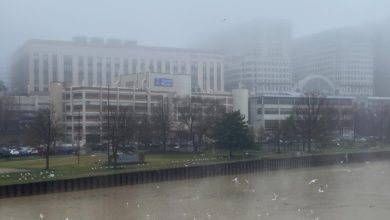Goldman Sachs CEO Lloyd Blankfein recently wrote an article in the Wall Street Journal about how the election offers an opportunity for Big Business to repair its “unproductive” relationship with the White House. The article ignores the enormous political value for the super-rich of having Obama as president during this economic crisis. But it does reveal how the capitalist class maintains its dictatorship over all of society, using its position to demand obedience from policymakers.
Blankfein explained that “There is more than a trillion dollars of cash that is sitting on the balance sheets” of non-banking corporations. (In addition, each of the four major commercial banks based in the United States controls more than $1 trillion.) He said that these companies would invest this cash and create jobs if they had greater “confidence in public finances” and “certainty about tax rates.”
Such statements, passing as normal commentary, reveal quite a bit. The head of the most important bank in the country, the de facto CEO of the business community, is admitting that at a time of enormous poverty, unemployment and suffering, there is plenty of profitable investment to be had. But Blankfein claims they are holding out until their terms are met: Use the “fiscal cliff” agreement to cut social spending and keep corporate tax rates low, and remove regulations and environmental considerations that are slowing down oil drilling and fracking.
‘Capital strike’
Significant sections of the capitalist class have deliberately withheld investment to engineer a more favorable tax and regulatory environment.
Well-connected conservative writer Charles Krauthammer outlined this strategy even more explicitly: “So, in every area, there’s going to be an increase in uncertainty, you know the increase in regulation. And when you don’t know what’s going to happen, you don’t invest. We are having a capital strike.”
In 2011, casino mogul Steve Wynn, a registered Democrat, let loose in similar fashion: “Everybody complains about how much money is on the side in America. You bet. And until we change … the conversation from Washington … those of us who have business opportunities and the capital to do it are going to sit … everybody’s going to be sitting on their thumbs.”
The Republican Party in Congress and during the presidential campaign repeatedly referenced business “uncertainty” to explain the sluggish economic recovery. A recent big business conference hosted by the Wall Street Journal was marked with apocalyptic statements from CEOs in every part of the economy demanding that a deal be made on the “fiscal cliff” or they would dramatically curtail investment.
“Uncertainty” is a misleading codeword for what is really going on—an insistence on the part of Big Business for more and more concessions. As Wynn indicated, he would sit “on his thumbs” and not invest in profitable opportunities unless the government turned away from the proposed new modest regulations and tax hikes on the rich.
Banks grow more powerful in crisis
Absent a mass struggle of poor and working people, it seems likely that a new austerity package will be passed. Wall Street will be downright jubilant if they receive a significant slashing of Social Security, Medicare and Medicaid in exchange for corporations giving up some tax loopholes. The great irony is that the capitalist class will have realized these long-held dreams at precisely the time that the populace appears to have taken a “progressive” turn and rejected the right-wing program of the Republican Party.
After Washington rescued Wall Street with a massive bailout and stimulus—moves that stopped the complete collapse of credit and banking institutions—the same corporations then took the political offensive to hold the rest of the economy hostage. As in the 1970s economic crisis, this crisis has revealed the dependence of the overall economy on the largest banks and corporations, which under capitalism hoard the social wealth and therefore are the only institutions truly capable of unleashing economic growth. Thus, Wall Street has more political power in the crisis, even though they created it.
Wall Street still controls the policymakers and the government apparatus that are theoretically supposed to regulate their industry. The top 14 entities lobbying on financial policy in 2012 are all banks, investment houses and industry trade groups. The top 50 lobbyists are almost entirely dominated by financial services corporations. Half of Goldman Sachs’ lobbying dealt with shaping tax policy or the Dodd-Frank Act, which was supposed to rein in their behavior. The fox truly has the keys to the henhouse.
This shows the absurdity of leaving the economy in the hands of big business. It is not just a question of regulations or tax policy, but who controls the vast resources of society, and thus the decisions of what jobs will be created, and when.
The Party for Socialism and Liberation has raised the demand for the big banks to be seized and put under the people’s democratic control.
Achieving full employment and economic growth, along with environmental sustainability and truly humane living standards, requires an entirely new system. We need socialism, a system in which the needs of society, rather than the profits of individuals, are the organizing principle, in which working and poor people are not subject to the whims of an endless boom-bust cycle, and in which Wall Street is removed from power.






